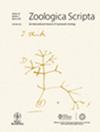Speciation in the Iranian plateau: Molecular phylogeny and evolutionary history of the Persian long-tailed desert lizard
IF 2
2区 生物学
Q2 EVOLUTIONARY BIOLOGY
引用次数: 0
Abstract
Mesalina watsonana is a well-known species of small lacertid lizards with an extensive species distribution that exhibits high genetic diversity. The species has a wide distribution range in Iran, some parts of Turkmenistan, Afghanistan, Pakistan, and northwest India. This study aims to generate phylogenetic and phylogeographic evidence to derive taxonomic recommendations supporting. Furthermore, this species can be used as a model for examining Iranian Platuea's historical biogeography. We conducted a very detailed sampling of its distribution and used genetic approaches. Phylogenetic analyses were done implementing two mitochondrial (Cytb and 16S) and one nuclear (C-mos) gene fragments. Combination of these results indicated that seven well-supported distinct clades exist within this species complex, i.e. Kerman clade, Esfarayen clade, Halil clade, Ardestan clade, M. watsonana clade, Bardaskan Clade, and Khuzestan Clade in Iran. Also, our results revealed that several distinct clades diverged due to geologic events when the Dasht-e-Kavir and the Zagros Mountains were formed. It seems that the ancestor of M. watsonana spread to Iranian Plateau before the formation of the Zagros Mountains. Orogenic activities of the Zagros Mountains and the formation of deserts have influenced the separation of these lineages from the Late Miocene by allopatric speciation. Generally, our findings suggest that each of the seven clades corresponding to distinct geographic regions deserves to be elevated to the species level.伊朗高原的物种分化:波斯长尾沙漠蜥蜴的分子系统发育和进化史
Mesalina watsonana 是一种著名的小型漆蜥,物种分布广泛,具有很高的遗传多样性。该物种广泛分布于伊朗、土库曼斯坦部分地区、阿富汗、巴基斯坦和印度西北部。本研究旨在提供系统发育和系统地理学证据,以得出支持分类学的建议。此外,该物种还可作为研究伊朗鸻鹬类历史生物地理学的模型。我们对其分布进行了非常详细的取样,并采用了遗传方法。我们利用两个线粒体基因片段(Cytb 和 16S)和一个核基因片段(C-mos)进行了系统发育分析。综合这些结果表明,在该物种复合体中存在七个支持良好的独特支系,即伊朗的克尔曼支系、埃斯法拉扬支系、哈利勒支系、阿德斯坦支系、M. watsonana 支系、巴达斯坎支系和胡齐斯坦支系。此外,我们的研究结果表明,在 Dasht-e-Kavir 和扎格罗斯山脉形成时,由于地质事件,几个不同的支系发生了分化。看来,M. watsonana 的祖先在扎格罗斯山脉形成之前就已扩散到伊朗高原。扎格罗斯山脉的造山运动和沙漠的形成影响了这些品系在中新世晚期的同域物种分化。总体而言,我们的研究结果表明,与不同地理区域相对应的七个支系中的每个支系都值得提升到物种水平。
本文章由计算机程序翻译,如有差异,请以英文原文为准。
求助全文
约1分钟内获得全文
求助全文
来源期刊

Zoologica Scripta
生物-动物学
CiteScore
5.60
自引率
0.00%
发文量
52
审稿时长
>12 weeks
期刊介绍:
Zoologica Scripta publishes papers in animal systematics and phylogeny, i.e. studies of evolutionary relationships among taxa, and the origin and evolution of biological diversity. Papers can also deal with ecological interactions and geographic distributions (phylogeography) if the results are placed in a wider phylogenetic/systematic/evolutionary context. Zoologica Scripta encourages papers on the development of methods for all aspects of phylogenetic inference and biological nomenclature/classification.
Articles published in Zoologica Scripta must be original and present either theoretical or empirical studies of interest to a broad audience in systematics and phylogeny. Purely taxonomic papers, like species descriptions without being placed in a wider systematic/phylogenetic context, will not be considered.
 求助内容:
求助内容: 应助结果提醒方式:
应助结果提醒方式:


